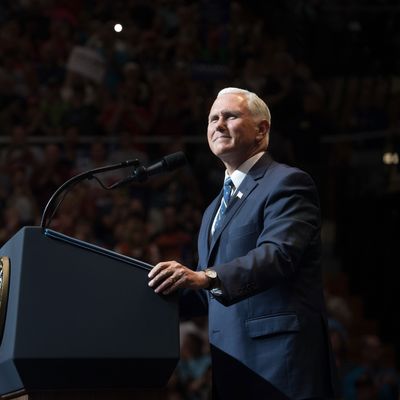
One of the many fascinating subplots of the horror story that the Trump era of American politics has become is the role of his faithful vice-president, Mike Pence. The white-haired Hoosier was struggling for reelection as governor of his state when Trump lifted him to the national ticket and then, astonishingly, to the vice-presidency. Since then he has chosen to become the Trumpiest Trump acolyte in Washington, earning the derision of Beltway observers by his obsequious behavior toward the Boss, who has no shame when it comes to flattery. So as a staunch conservative turned Trumpian maximalist, Pence is the natural successor to the 45th president as leader of the GOP, right?
Not so, according to Yahoo’s Matt Bai, who wrote a column contemptuously dismissing Pence’s chances to grab the brass ring of the presidency. The veep, says Bai, would (1) be brushed aside by Trump in favor of one of his family members [seriously?] if he retires in triumph after two terms; (2) go down the tubes with Trump if he resigns in disgrace or is impeached before 2020; and (3) be rejected by the GOP as the 2020 nominee if Trump is so unpopular he chooses not to run because others could distance themselves from the incumbent more easily.
Bai’s Pence-Can’t-Win hypothesis is interesting, but I don’t buy (Bai?) it. I think Matt hasn’t fully internalized the extent to which Pence’s party has succumbed to Trump-worship nearly as abject as Pence’s own.
In looking at various scenarios for near-term presidential elections, it’s helpful to separate Pence’s chances at becoming a GOP presidential nominee from his party’s chances of winning a general election — 2020 could be a tough year for any Republican nominee. Remember: the GOP has been on the short end of the popular vote in six of the last seven presidential elections. Demographic trends are famously not moving in their direction. And totally aside from the other problematic issues the Trump presidency has created, the odds of a major economic turndown by 2020 are pretty high, and that’s not even taking into account the possibility of trade wars or other political disturbances.
If it’s 2024 we are talking about, then Republican odds could be even worse thanks to the “incumbent party fatigue” that probably contributed to Hillary Clinton’s upset loss in 2016.
Having said all that, Mike Pence’s chances of succeeding Trump as Republican presidential nominee are much stronger than Matt Bai realizes. Yes, Pence’s brown-nosing of Trump is cringeworthy to those not initiated in the cult. But it many respects it is just an exaggerated version of what the entire GOP — and particularly its dominant conservative wing — has undertaken. Every day we get more confirmation that the very things about Trump that scandalize his critics are sources of pride or belligerent denial among both elite and rank-and-file Republicans. Consider the trajectory of the man who until recently was thought most likely to represent some future movement-conservative rebellion against Trump, if it were ever to materialize: Ted Cruz, the 2016 runner-up who didn’t even endorse his vanquisher until late in the general election cycle. He last made national news by penning a sycophantic tribute to Trump for Time magazine that is truly Pence-worthy.
Perhaps non-Republicans think it’s obvious that a Nikki Haley (whose superior suitability Bai mentions in connection with 2020) could keep the GOP united without tarnishing it too much with Trump’s controversial legacy. But the more Trump is embattled, the more nearly all Republican officeholders are likely to come to his outspoken aid, making that sort of distancing impossible, and Pence simply the first among equals in bending the knee to the King. As for Trump himself, nothing would more satisfy his craving for political immortality (not even Ivanka ’24) than transferring the presidency to the man who has led his party and his ideological group in turning a hostile takeover into a joyful collaboration.
Another factor undermining any electability-based objections to a Pence succession is this: short of a major national catastrophe, it’s unlikely Trump is ever going to become significantly more unpopular than he was in October of 2016, after the Access Hollywood video broke. It will be difficult to convince Republican voters or conservative media that a Trumpian party is ever doomed.
It’s also worth remembering that Pence has a unique, even an intimate relationship with the single-most powerful GOP constituency group, the Christian right, which views him as the faithful servant-leader who shines a steady light unto the path of the heathenish tribal chieftain. These are people that will strongly resist any defenestration of the heir apparent.
Bai caps his case for Pence’s future irrelevance with an impressive-sounding bit of historical data:
There have been 24 vice presidents since 1900. Exactly one of them — George H.W. Bush — was elected president while occupying the vice presidency, following a popular presidency and facing a weak opponent. That would not be Pence’s situation.
This is a classic triple-loaded statistic. Five of those 24 vice-presidents ascended to the presidency upon the death or resignation of their predecessors. One resigned from the vice-presidency and another died while in the office. Five others were never in the position of being “elected president while occupying the vice presidency” because the president under which they served was defeated for reelection, or because they were dropped from the ticket themselves before their running mate’s tenure in office ended. Eight never seriously aspired to the presidency after being vice-president.
That leaves a data set of exactly four vice-presidents since 1900 who ran for president while occupying the vice-presidency. One of them, as Bai notes, won. Another, Al Gore, won the popular vote but lost in the Electoral College. The other two, Richard Nixon and Hubert Humphrey, lost very close general elections. And all four of them, needless to say, won the presidential nominations of their party.
So, more than likely, would Mike Pence.






























